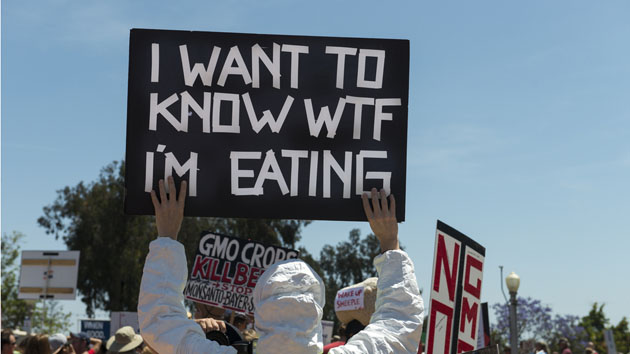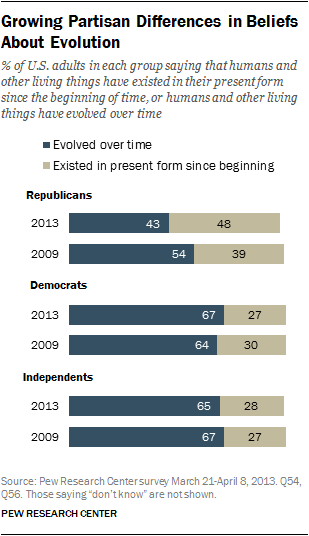
Michele Bachmann denounced "government injections" during a 2011 GOP presidential debate. She would later suggest that the HPV vaccine might cause "mental retardation."Edmund D. Fountain/Tampa Bay Times/ZUMA
So who’s worse when it comes to ignoring and denying science, the political left or the political right?
For a long time, those wishing to claim that both sides are equally bad—we’re all biased, just in different directions—have relied upon two key issues in making their case: vaccines and genetically modified foods, or GMOs. The suggestion is that these are basically the liberal equivalent of evolution denial or global-warming denial. Skeptic magazine founding publisher Michael Shermer, for instance, prominently cited resistance to GMOs in a Scientific American article last year entitled “The Liberals’ War on Science.” As for vaccines? In a recent segment entitled “An Outbreak of Liberal Idiocy,” no less than The Daily Show suggested that vaccine denial is a left-wing scourge:
There’s just one problem: Commentators seem to just assume, without evidence, that anti-science beliefs on these two issues are predominantly a liberal phenomenon. But that assumption hasn’t been subjected to nearly enough scrutiny, especially in light of high profile vaccine-skeptic conservatives like Donald Trump and Michele Bachmann. The GMO issue is also politically suspicious: It is inherently conservative, in the purest sense of the word, to resist technological changes to the nature of food production (or anything else, for that matter).
And sure enough, the evidence just doesn’t support the idea that vaccine denial is some special left-wing fixation—and it’s barely any kinder to received wisdom on the issue of GMOs. I will demonstrate as much below, but first, let’s remember why this matters.
It is very clear that there are certain major issues where there is only one correct scientific answer, and political conservatives are much more likely to deny that answer than are liberals or moderates. Conservatives have also been shown to trust scientists less than liberals or moderates do. So no wonder they also reject their most important (if sometimes inconvenient) conclusions more often.
Here are the top two hits (but by no means the only examples) of conservative science denial, followed by some hard data on public attitudes about vaccines and GMOs:
Climate change: Here, the undeniable reality is that humans are causing global warming, and polls have repeatedly shown that it is political conservatives and Republicans who deny this fact about the world. According to recent data from the Yale and George Mason projects on climate change communication, for instance, 75 percent of liberal Democrats, but only 22 percent of conservative Republicans, accept the reality that humans are causing climate change—more than a 50-point difference! Myriad other polls and studies have found something similar.
Evolution: Here, the undeniable reality is that humans share a common ancestry with the rest of life on Earth, and that the diversity of life that we witness all around us is the result of an evolutionary process. And here again, those on the right deny this reality much more than do those on the left (although notably, the gap is not as wide as it is on the climate issue). According to a late 2013 Pew study, 67 percent of Democrats, but only 43 percent of Republicans, agree that “humans and other living things have evolved over time.” That’s a 24-point difference. Indeed, based on these data, 48 percent of Republicans (compared to just 27 percent of Democrats) think “humans and other living things have existed in their present form since the beginning of time,” meaning that the GOP today is very nearly a majority creationist party.
That’s a seriously big deal, given that Young Earth Creationism embraces many other kinds of science denial besides the mere rejection of evolution. Rejection of the age of Earth, for instance, and accordingly, of large swaths of physics and geology. It is a deeply anti-science ideology that extends far beyond one’s views about any particular scientific issue.
So it is very natural to ask whether there is really anything parallel to this rejectionism on the modern American left, and to try to adduce examples. However, the vaccine and GMO examples don’t cut it. To show as much, let’s examine them in turn.
Vaccines: Here, the undeniable reality is that childhood vaccines are safe and do not cause autism. So do liberals deny this fact more frequently than conservatives?
Recent research suggests the answer to that question is “no.” In a 2013 paper published in PLOS One, for instance, Stephan Lewandowsky and his colleagues surveyed a representative sample of 1001 Americans about their ideological beliefs and their views on contentious science topics. That included vaccines, where they used a five-item questionnaire to assess people’s views, including statements like “I believe that vaccines are a safe and reliable way to help avert the spread of preventable diseases” and “I believe that vaccines have negative side effects that outweigh the benefits of vaccination for children.”
The study did not find that people on the left were more likely to oppose or distrust vaccines. Rather, it found a highly nuanced result. The researchers examined two related but distinct contributors to right-wing ideology: self-identification as a political conservative and support for the free market. It found that while the former was related to somewhat more vaccine support, the latter was related to somewhat more vaccine opposition. According to Lewandowsky, the two opposing forces “virtually cancel overall.”
Other studies have found similar results. In a 2009 paper, Yale’s Dan Kahan and his colleagues found that the conservative ideological values of “hierarchy” and “individualism” were both linked to greater opposition to the HPV vaccine in particular. In a paper from earlier this year, meanwhile, Kahan found that the idea of a link between the political left and the belief that vaccines in general are dangerous “lacks any factual basis.” In fact, if anything, he found a small increase in belief in vaccine risks as one moved to the right of the political spectrum.
If you’d prefer to examine the patterns of vaccine-preventable disease outbreaks, meanwhile, those also seem politically diverse. We are having a horrible year for measles, for instance, with 18 outbreaks and 592 cases, more than double the total in any previous year since 2001. And the 21 states that have seen cases and outbreaks run the political gamut; they include California and Massachusetts, but also Alabama, Tennessee, Texas, and Ohio (home to a large outbreak in the Amish community, a group of people that can hardly be called “liberal”). Last year, meanwhile, there was a measles outbreak clustered around a Texas megachurch.

When it comes to the right and vaccines, there’s also evidence like this:
I am being proven right about massive vaccinations—the doctors lied. Save our children & their future.
— Donald J. Trump (@realDonaldTrump) September 3, 2014
I’m not against vaccinations for your children, I’m against them in 1 massive dose.Spread them out over a period of time & autism will drop!
— Donald J. Trump (@realDonaldTrump) September 4, 2014
So in sum, the evidence that vaccine opposition is somehow specially tied to left-wing beliefs is just lacking. Rather, the largest factor here, according to Lewandowsky’s research, is conspiratorial beliefs, which are hard to categorize as either left wing or right wing in nature.
Genetically modified foods: Now let’s move on to the GMO issue. Here, it is less obvious what a clear-cut anti-science belief would actually be, but perhaps the most obvious case is the belief that genetically modified foods are harmful if consumed by humans. This position has been rejected by the board of American Association for the Advancement of Science, which assures us that “crop improvement by the modern molecular techniques of biotechnology is safe.” So do liberals disproportionately believe wrong things about genetically modified foods?
Lewandowsky’s paper also examined GM beliefs, once again using a five-point scale that included statements like “I believe that genetically engineered foods have already damaged the environment” and “Genetic modification of foods is a safe and reliable technology.” And the researchers found that “opposition to GM foods was not associated with worldview constructs.”
“This result is striking,” the researchers went on to say, “in light of reports in the media that have linked opposition to GM foods with the political Left.”

Lewandowsky et al. aren’t the only ones. For instance, an independent analysis of data from the General Social Survey by the Discover magazine blogger Razib Khan also found no real left-right difference in views about GMOs.
Still, given just how striking these results are, and how contrary to what people assume, I sought to verify them by examining yet another poll. So with much help from the Roper Center for Public Opinion Research at the University of Connecticut, which supplied an abundance of data, I looked into the details behind a January 2013 CBS News poll that asked a variety of questions about GMOs using a representative national sample of 1,052 Americans.
For the most part, the results support Lewandowsky and Khan. GMO concern appears largely spread across the spectrum in this poll, and while it is somewhat stronger among Democrats (and, as we’ll see, especially strong on the far left), it is also very strong among Republicans and independents. For instance, the poll found that all three groups overwhelmingly support the labeling of foods containing GM ingredients (an idea the American Association for the Advancement of Science rejects): 90 percent of Republicans, 94 percent of Democrats, and 95 percent of independents were in favor.
Getting closer to a purely scientific issue, respondents were asked, “How concerned are you about genetically modified or genetically engineered food—Very concerned, somewhat concerned, not too concerned or not at all concerned?” Seventy-one percent of Republicans, 80 percent of Democrats, and 75 percent of independents said they were either “very” or “somewhat” concerned.
What’s more, those who did profess this level of concern then went on to answer a second question, in which they were asked more precisely what they were worried about. Twenty-five percent of concerned Republicans, 29 percent of concerned Democrats, and 25 percent of concerned independents answered “not safe to eat.” Meanwhile, 33 percent of concerned Republicans, 39 percent of concerned Democrats, and 37 percent of concerned independents answered “cause health problems.” (These are the clear-cut science deniers.)
So while there might be slightly more concern about GM foods among Democrats, overall concern is broad and appears substantially nonideological in nature—which makes sense if you think about the concerns as being motivated by people’s fears of consuming something that is supposedly icky or unnatural. Indeed, when asked in another survey question whether they would eat “genetically modified or genetically engineered fish,” 74 percent of Republicans, 73 percent of Democrats, and 71 percent of independents said “no.”
However, there is one important qualification. Although Democrats, Republicans, and independents do not look all that different on GMOs, it turns out that if you split Democrats and Republicans up into different ideological groups, you can discern more left-right differentiation on the issue (even as worries remain spread across the spectrum). The CBS News poll did just that. In addition to their party affiliation, people were also asked whether they self-identified as “very liberal,” “somewhat liberal,” “moderate,” “somewhat conservative,” and “very conservative.” When you break it down this way, 92 percent of “very liberal” respondents were either “somewhat” or “very” concerned about GMOs, compared with only 71 percent of “very conservative” respondents. (Those who were “somewhat liberal,” “moderate,” and “somewhat conservative” look pretty similar; their percentages are 79, 75, and 74, respectively.)
However, it is important to note that people who are “very liberal” are also the smallest ideological group in the survey by far (6 percent). There were more than twice as many “very conservative” respondents (13 percent), and since the survey was nationally representative, we should expect something similar for the United States as a whole.
Such, then, are the data. They do not support for the idea that vaccine denial is a special left-wing cause. As for GMOs, while resistance may be strongest on the far left, worries on this issue are quite prominent across the spectrum as well.
In neither case are these beliefs a mirror image, on the left, of climate change or evolution denial. And as for other issues that are sometimes cited as examples of left-wing science denial, such as fracking and nuclear power? Those examples are problematic, too. (See here for my thinking on these subjects.)
In the end, maybe the best way to think about the politics of science denial is this: There are two major, separate types of science denial out there. One is clearly right-wing and is driven by conservative activists, think tanks, media outlets like Fox News, and politicians. It is widely adhered to in the conservative movement, and it is highly politically relevant because conservatives (and Republicans) take their views on these issues as motivation to try to affect policy. This describes the situation on climate change, and on the teaching of evolution (and numerous other topics, like contraception the relationship between abortion and health).
This type of science denial, institutionalized within a major party and its activist base, has little parallel on the modern American left or within the Democratic Party. However, there’s another kind of science denial, which may have many important consequences but is not driven by any one party. Its various fixations may at times appear more left wing, but are found across the political spectrum. Denialism about vaccines and GMOs fits more neatly into this latter category.
That’s not to exonerate any kind of science denial. Nor is it to deny that there are liberals or leftists out there who hold unscientific beliefs—the polls above clearly capture such people. Nonetheless, it is to say that modern conservative science denial remains a unique phenomenon.
So why, then, do people so readily assume that vaccine and GMO denial are fundamentally left-wing causes? I suspect because those of us who live in liberal, largely bicoastal cities meet vastly more liberals than conservatives; and thus, we are far more likely to actually encounter liberal or left-wing people who hold these beliefs.
However, unlike pollsters, we aren’t sampling the whole country in a statistically reliable way through our experiences. Science, though, is all about putting aside beliefs and anecdotes in the face of data.


















